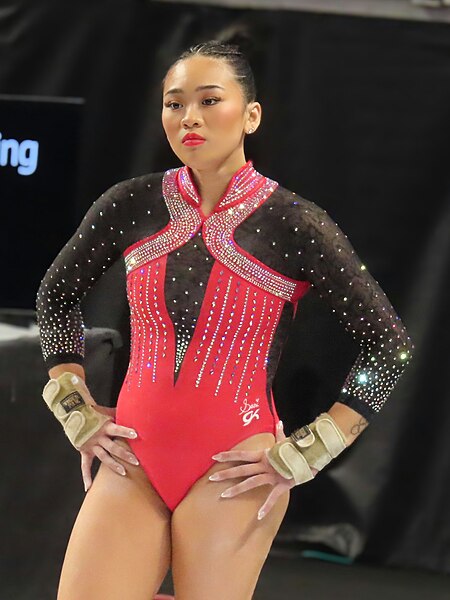 After watching the 2024 Paris Olympics which closed last week, I definitely felt that AAPI athletes had a high profile. That led me to decide to create this retrospective on AAPI (and some extent, the Asian Canadian) presence in the Olympics and its impact. There are stories about medaling, but also stories that didn’t involve medaling. I also thought about questions such what kind of impact would the presence of AAPI on Team USA make on the perpetual foreigner stereotype in the US and why AAPI Olympic athletes tend to be in certain sports and play certain positions.
After watching the 2024 Paris Olympics which closed last week, I definitely felt that AAPI athletes had a high profile. That led me to decide to create this retrospective on AAPI (and some extent, the Asian Canadian) presence in the Olympics and its impact. There are stories about medaling, but also stories that didn’t involve medaling. I also thought about questions such what kind of impact would the presence of AAPI on Team USA make on the perpetual foreigner stereotype in the US and why AAPI Olympic athletes tend to be in certain sports and play certain positions.
From a medaling perspective, Sunisa Lee’s gold in Team Gymnastics, and bronze medals in the all-around and uneven bars were in my opinion the most visible. It is a remarkable achievement after her struggles with kidney disease. Another prominent Asian American medal winner was Torri Huske in swimming, who pulled in an amazing three golds and two silver medals.
In fencing, Lee Kiefer won a gold in team foil and and the women’s individual foil. She was joined by Maia Weintraub in team foil. More than 10 years ago, we noted that NCAA fencing had a high percentage of Asian Americans relative to their population. The latest NCAA stats for 2022-2023 report that this percentage has increased to Asian Americans being 23% of the male fencers and 28% of female fencers.
The Team USA Women’s Volleyball team won silver, netting Justine Wong-Orantes a medal. The Team USA Men’s Volleyball team took bronze. As a result, AAPIs Eric Shoji, Micah Christenson, Micah Ma’a, and Garrett Muagututia got to take home medals.
Winning medals wasn’t the only way that AAPIs became noticed.
I previously posted how US Table Tennis gained visibility during the Paris Olympic, with an assist from Steph Curry in instigating things with Anthony Edwards. Women’s Rugby got an enormous boost after Michelle Kang donated $4 million to its program.
Sunny Choi and Logistx did not medal in breaking, a sport which many people felt that Australian competitor Raygun delegitimized. That is so unfortunate, as the focus on her took away from competitors like Phil Wizard (Phillip Kim), an Asian Canadian who won the men’s breaking gold. Speaking of Asian Canadians in the Olympics, there were major similarities to Team USA in Asian representation. The Canadian Badminton and Table Tennis teams were completely Asian. Other Asian Canadian medal winners include Skylar Park in Taekwondo and Christa Deguchi in Judo.
Some Asian Americans competed for other countries. The Philippines Women’s Gymnastics team had three Asian Americans compete in Paris. Aleah Finnegan, Levi Ruivivar, and Emma Malabuyo did not medal, however.
It’s clear that AAPIs are concentrated in specific sports. Why is that? I think that this Reddit on why there are so many Asian American fencers has some valid opinions on why this concentration occurs. Fencing, like some other heavily Asian American sports like Table Tennis and Badminton, are individual sports where that size is not such a great factor. These are not teams sport that can have you passed up because of your ethnicity. Asian Americans do have roles in teams sports like Volleyball where specific skills can overcome size (e.g. Eric Shoji and Justine Wong-Orantes are liberos on Team USA Volleyball, like Tamari Miyashiro, who got a silver in the 2012 Olympics). Pacific Islanders tend to be bigger than Asian Americans, which is one reason why they were setters and outside hitters on the Men’s volleyball team and were on the Team USA Men’s Rugby team).
Another factor with Fencing is that niche sports like fencing and golf are one way into the Ivy league and other elite colleges. Maia Weintraub goes to Princeton, and fellow gold medalist for Team Fencing, Lauren Scruggs, goes to Harvard. Lee Kiefer’s sister, fenced for Harvard. Rose Zhang and Colin Morikawa on the Team USA played golf at Stanford and U.C. Berkeley, respectively.
Did the visibility of AAPIs dent the perpetual foreigner stereotype in the American mindset? It’s hard to say, but I did love seeing the respect that Anthony Edwards and Steph Curry gave the USA Table Tennis team. Not that I could say that no incidents occurred (there are some snide comments about ethnicity on YouTube videos of the Table Tennis team, Curry, and Edwards on the open ceremonies boat), but I didn’t hear about the kinds of anti-Asian sentiment that affected athletes at the Tokyo Olympics. Then again, that Olympics occurred during the height of the Covid-19 Pandemic. It will be interesting to see what happens at the 2028 Olympics, which are in Los Angeles, a heavily Asian American area.
(photo credit: Ocoudis licensed under the Creative Commons Attribution-Share Alike 4.0 International license.)








